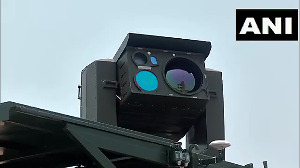It's a strategic approach in which the country's military and defence mechanisms evolve continuously in tandem with emerging threats.
The new strategy anticipates events and prepares to counter those proactively.

Defence Minister Rajnath Singh has announced that the government is adopting a doctrine of 'Adaptive Defence' to tackle security challenges in today's fast-changing world.
He made the announcement on Tuesday, November 12, while addressing a conclave of military strategists at the Manohar Parrikar Institute for Defence Studies and Analyses in New Delhi.
He described 'Adaptive Defence' as a strategic approach in which the country's military and defence mechanisms evolve continuously in tandem with emerging threats.
The new strategy anticipates events and prepares to counter those proactively.
India's current military doctrine adopts a three-fold approach against three potential threats.
The Indian military has traditionally been structured, trained, deployed, and operationally poised in a 'deterrent' posture against Pakistan and a 'dissuasive' posture against China.
At the same time, India's maritime forces are poised for an 'expeditionary role' in the Indian Ocean Region.
The new 'Adaptive Defence' strategy does not fundamentally change these roles. However, there is greater attention to gearing up for the new forms of conventional warfare that have emerged in recent decades.
Starting from the Cold War in the 20th century, which was restrained by nuclear deterrence, came the post-9/11 'global war on terror', followed by Russia's full-scale invasion of Ukraine, which triggered the largest land war in Europe since World War II (WWII).
Commentators are harking back to the WWII era of 'total war', in which combatants drew on vast resources, mobilised entire societies and economies, and prioritised war over all other state activities.
Mara Karlin, former US assistant secretary of defence, has written in the latest issue of Foreign Affairs: 'An era of limited war has ended; an age of comprehensive conflict has begun.'
'Adaptive Defence,' the defence minister said, 'was not merely a strategic choice but a necessity.
'As the threats to our nation have evolved, so too must our defence systems and strategies.
'We should be prepared for all future contingencies. It is more than just protecting our borders; it is about securing our future.'
The security challenges India faces today range from the traditional border-related threats to unconventional threats such as drones and swarm technologies, cyberattacks, emerging technologies in AI and hybrid warfare.
'India is aiming to become a drone hub of the world,' the minister said.
Steps already taken by the government include appointing a tri-service chief of defence staff, promoting jointness among the three services, improving the training curriculum, and intensifying military diplomacy to forge new defence partnerships around the world.
'Our interconnectedness is as much a blessing as it is a challenge. If our threats are transnational, so should be our solutions,' the minister said.
On developing indigenous capability, he said: 'This must not be seen as an isolationist approach, as we are very much open to foreign investment, collaboration, joint R&D, and co-production.'
The defence minister pointed to the successful indigenous projects such as the Tejas light fighter, the aircraft carrier INS Vikrant, and the DRDO's ballistic missile programmes.
'India is exporting defence items to over 100 nations, with the top three destinations for defence exports in 2023-2024 being the US, France, and Armenia,' Rajnath Singh said. 'We hope to achieve the target of Rs 50,000 crore (Rs 500 billion) worth of defence exports by 2029.'
Feature Presentation: Ashish Narsale/Rediff.com












 © 2025
© 2025